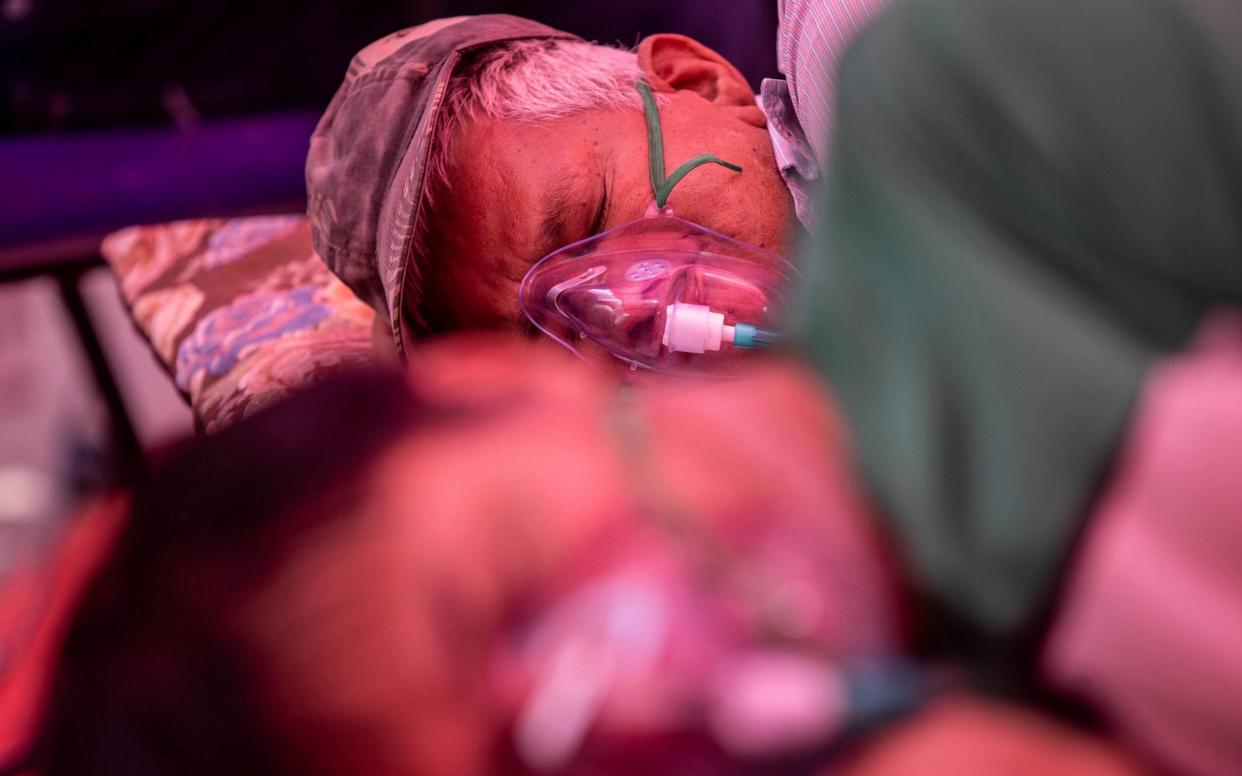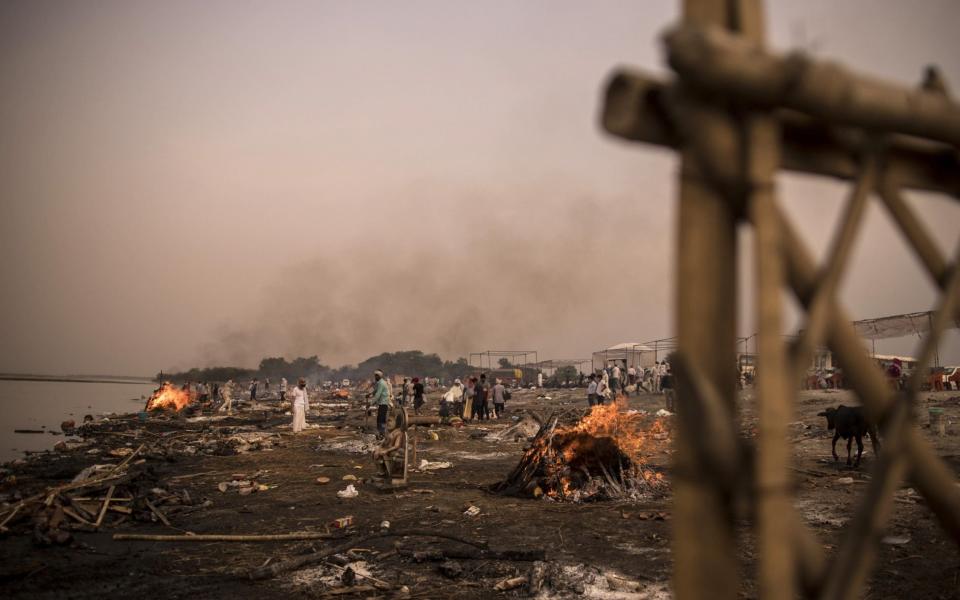Pressure grows for new national lockdown as India breaks global record with 400k daily cases

- Oops!Something went wrong.Please try again later.
- Oops!Something went wrong.Please try again later.
India’s most senior opposition politician, Rahul Gandhi, has demanded a nationwide lockdown, as pressure grows on Prime Minister, Narendra Modi, with India reporting a global record of 412,626 new daily cases on Wednesday.
A second wave of Covid-19 driven by new, more contagious variants has devastated India and the sheer volume of infections, with over 300,000 new cases for 15 consecutive days, has overwhelmed the nation’s threadbare healthcare system.
Thousands of Indians are dying outside hospitals and in their homes due to oxygen and bed shortages. The residents of major Indian cities, like and Delhi, are also having to turn to the black market to procure essential drugs, due to shortages.
While Mr Modi has resisted imposing a national lockdown so far, nearly a dozen Indian states have now imposed their own curfews.
India’s most populous state of Uttar Pradesh, home to over 200 million people, enforced a five-day lockdown this week, while curbs will also be enforced in the states of West Bengal and Himachal Pradesh from Thursday.

Mr Modi is worried about a livelihoods backlash if he imposes nationwide restrictions, as last year’s sudden two-month lockdown spawned a major humanitarian crisis and pushed 400 million Indians into further poverty.
Approximately 90 per cent of India’s 500 million-strong workforce were employed informally before the pandemic; meaning they survived on their daily – usually cash – earnings.
Confining Indians to their homes meant that millions of families were unable to earn and instead had to rely on irregular food aid, with villagers starving to death in the shadow of India’s iconic Taj Mahal.
Separately, the lockdown resulted in the largest forced movement of people since Partition in 1947, as a large proportion of India’s 40 million internal migrant workers attempted to return to their home villages after losing their jobs.
Thousands died on the way as they walked hundreds of kilometres on foot in the baking heat, while others brought the virus back to previously unaffected, remote Indian districts where healthcare provision is at its weakest.
Mr Modi, who belongs to the Hindu nationalist Bharatiya Janata Party (BJP), had enjoyed unwavering popularity since his election in 2014 but his handling of India’s second wave has brought unprecedented criticism.
A failure to scale up both India’s public healthcare system and vaccination programme while cases dipped earlier this year is attracting significant ire, even from India’s media which, under heavy pressure from the BJP, had previously towed the party line.
After a sub-par performance in the crucial West Bengal state election, during which the opposition Trinamool Congress (TMC) triumphed over the BJP, Mr Modi fears that announcing a lockdown will further erode his support among India’s lower and middle classes.
But, the pressure on India’s premier to introduce nationwide curbs is growing. On Wednesday, India’s leading opposition politician, Rahul Gandhi, of the Congress Party, took to Twitter to demand a lockdown: “GOI [Government of India] doesn’t get it. The only way to stop the spread of Corona now is a full lockdown – with the protection of NYAY [a welfare scheme] for the vulnerable sections,” he wrote. “GOI’s inaction is killing many innocent people.”
Mr Gandhi’s plea comes after the Indian media reported that the members of Mr Modi’s own Covid-19 task force were “pushing hard” for a second national lockdown.
“The Covid-19 task force is trying to say this very aggressively for the last few weeks. That we should tell the people at the top that we should have a lockdown,” a source told the Indian Express.
On Monday, top Indian business leaders followed senior members of the Indian judiciary in pushing for nationwide curbs: “[We need to] curtail all non-essential economic activity requiring physical presence of employees at the workplace for the next two weeks,” said Uday Kotak, the President of the Confederation of Indian Industry.
Finally, Many leading doctors are advocating for lockdowns, arguing that if the numbers of patients arriving in their hospitals dropped then they would be able to save more lives.
On Wednesday, India reported 3,980 deaths but due to gross underreporting of fatalities, the actual figure is believed to be up to 20 times higher.
Dr Sumit Ray, the Medical Superintendent at Holy Family Hospital in Delhi, one of the best hospitals in India’s capital, told the Telegraph that India faces no choice.
“There is a limit to the number of beds that we can have in a hospital and our first priority is to stop transmission. Therefore, a lockdown is absolutely necessary when we are seeing a surge of this nature,” said Dr Ray. “I am not generally in support of lockdowns but if we do not introduce curbs then we are going to continue to see people dying in greater numbers.”
The western Indian state of Maharashtra which is home to the country’s financial capital of Mumbai introduced restrictions first, on April 14, despite concerns over the impact on livelihoods.
But, the positivity rate in Mumbai has now fallen from 28 per cent in early April to nine per cent on Tuesday, a trend that has been seen across Maharashtra. Access to hospitals and oxygen is now considered better in Mumbai than in any other major city across the country.
Lives hang in the balance in Modi’s heartland
There are thousands of villages like Nagla Vidhichand scattered across northern India’s Hindi heartland; a reliable bastion of support for the Hindu nationalist Prime Minister, Narendra Modi.
But, last October, Nagla Vidhichand, which sits less than ten kilometres from India’s iconic Taj Mahal, was plucked from obscurity and made headlines nationwide.
Five-year-old resident, Sonia Kumari, died from starvation in her family’s makeshift home, causing many residents to question India's seemingly untouchable premier for the first time.
Ms Kumari's mother was one of 400 million Indians pushed into poverty by a two-month Covid-19 lockdown and prolonged restrictions, which caused unemployment to skyrocket.
Now, one year on, with India reporting over 300,000 Covid-19 cases for 15 consecutive days, the pressure is again building on Mr Modi to announce a nationwide lockdown to slow the spread of the virus.
It is very difficult to feel any sympathy for Mr Modi during India’s second wave – his government appears to care far more about protecting its image than India’s healthcare system, which has totally collapsed under the weight of cases.
Thousands of critically ill Indians are dying daily while they wait for medical care and not a household on the subcontinent is seemingly unaffected, with social media becoming a rolling obituary.
And the second wave shows no sign of slowing. After first wreaking havoc in India’s megacities of Mumbai and Delhi it is now spreading uncontrollably in India’s largely rural states, with entire generations of elders in some villages dying.
Mr Modi’s own Covid-19 task force is “pushing hard” for a lockdown and their pleas have been echoed by some of India’s leading businesspeople, judiciary, and now the country’s most high-profile opposition politician, Rahul Gandhi.
Speaking to doctors in Delhi on Thursday, they say, unfortunately, the country faces no choice and a lockdown is the only solution to lower the number of Indians requiring admission and to bring an end to critical patients dying, waiting in vain, in hospital car parks.
In Mumbai, where a localised lockdown was implemented early – on April 14 – the positivity rate has dropped from 28 per cent to nine per cent on Tuesday.
India’s financial capital is one of the only places in the country where available hospital beds and oxygen now outstrips demand – indicative that lockdown is working.
It does, therefore, seem inevitable that a nationwide lockdown will be implemented over the upcoming days, and for the 90 per cent of Indians that are employed informally and rely on access to public space to earn a living, they can do nothing but hope the Indian Government provides sufficient food and financial aid this time.
In villages like Nagla Vidhichand, lives depend on it.
Protect yourself and your family by learning more about Global Health Security

